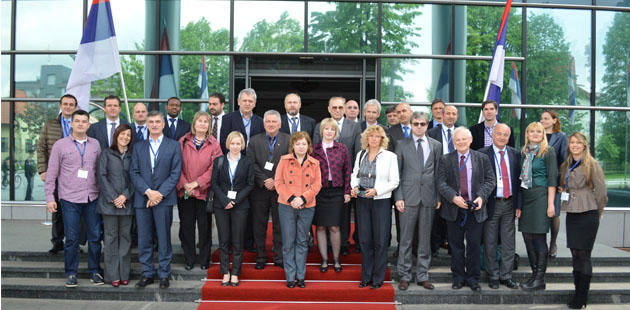CAE takes part in the "Informal Conference of the South East European Directors of Hydro-Meteorological Services "
May 2014

On 28th and 29th April CAE participated to the 13th Informal Conference of the South East European Directors of Hydro-Meteorological Services (ICSEED), held in Banja Luka, Republic of Srpska (Bosnia and Herzegovina).
The ICSEED is a regional informal forum established on a voluntary basis by the Directors of Hydro-Meteorological Services of South East European Countries with the main purpose of enhancing cooperation and contacts in the field of meteorology, hydrology and related disciplines, under the sponsorship and the guidance of WMO and its regulations. ICSEED members are the Directors of Hydro-Metereological Services of: Albania, Bosnia and Herzegovina (Federation of Bosnia and Herzegovina and Republic of Srpska), Bulgaria, Croatia, Cyprus, Former Yugoslav Republic of Macedonia, Israel, Montenegro, Serbia, Slovenia, Romania, Turkey. WMO and other international actors and institutions (EUMETSAT, ECMWF, European Commission – DG Enlargement, UNISDR, ISRBC) always take part to the meetings.
ICSEED aims at facilitating, promoting and strengthening professional regional relationships, capacity building, expertise and technology transfers. Its meetings take place once a year and are organized in turn by each member.
As the first and only private company ever admitted to the forum, CAE sponsored the 13th edition of the ICSEED, hosted by the Republic Hydro-Meteorological Service of the Republic of Srpska (Bosnia and Herzegovina) last 28th and 29th April. The conference was opened by Dr. Stevo Mirjanić, Minister of Agriculture, Forestry and Water Management of Republic of Srpska, and by Filipe Domingos Freires Lúcio, Director of Global Framework for Climate Services (GFCS) – WMO, at the premises of the Government of Republic of Srpska. The Directors and Deputy Directors of HMSs of Bulgaria, Croatia, Federation of Bosnia and Herzegovina, Former Yugoslav Republic of Macedonia, Republic of Srpska, Romania, Serbia, Slovenia, Turkey, as well as representatives of high international institutions such as WMO, UNISDR (United Nations Office for Disaster Risk Reduction) , ISRBC (International Sava River Basin Commission). Through the speech of Mr Guido Bernardi, Marketing and Business Development Manager, CAE presented to the Directors of Hydro-Meteorological Services of South East Europe its “Best practices for Multi-Hazard Early Warning and Real Time Monitoring”.
Directors of Hydro-Meteo Services need data, not machines: starting from this premise, CAE illustrated the lessons learnt across 37 years of experience in multi-hazard monitoring at the service of its clients, with about 4200 automatic stations installed across the world and a reliability in real time data acquisition and transmission close to 100%. In order to grant real time data acquisition with a such high score of reliability, and specifically in case of extreme events, CAE considers as its “best practices” – namely requirements that the clients should always require to their suppliers of monitoring systems:
To carry out preliminary in-site surveys and accurate site project lay-out: in this sense, each station should be installed according to a specific and tailored design project, on the basis of the surrounding environment and of the requested performing targets
To use resistant metallic carpentry and quality materials, as well as solid and reliable civil works packages, as a first requirement for solid and long-lasting systems
To implement two-way and proprietary communication system: CAE expertise suggests the radio system as comparatively the best, granting continuous real-time data transmission also in case of overburdening of telephone networks (this can be a significant problem, in case of emergencies, for a GSM-UMTS based communication system), and not depending on specific time-slots allowed for transmission (such as with a satellite-based communication system)
To ensure low energy consumption and independency by main line power, to grant data acquisition and transmission also in case of long lasting problems of the solar cell or shortage of electric power: in case of extremely low temperatures, when heated sensors are needed, CAE suggests to use the main line power only for heating the carpentry around the sensors, and not for directly powering the station
To implement an advanced maintenance program as a crucial requirement to grant real-time data acquisition and transmission with a reliability close to 100%. The client should require to the supplier of monitoring systems to subscribe specific and strict contract clauses to ensure data acquisition and transmission with a significant level of reliability, including penalties in case of failure.
From a more technological point of view, in order to maximize the client’s investment , CAE suggest as further “best practices” (obligations that the client should require to the supplier of real-time automatic monitoring systems):
- Multi-hazard and Powerful Technology, as the automatic station must be able to manage any kind of sensors, including cameras and other high frequency sampling devices
- Extreme interoperability with other technologies and international standard protocols for data sharing, especially at the central unit
- Easiness to empower devices, facilitating the development of new tools and functionalities both at data-logger level (Linux embedded operating system including a ready to use Software Development Kit) and at Central Unit Level (Powerful Web-Services including a ready to use Software Development Kit).
CAE presentation was very appreciated by the audience, and the Company was invited to repeat the experience – with more specific focuses – next year, in occasion of the 14th edition of the ICSEED that will be held in Tirana (Albania), as well as at some HM Services in the region.
